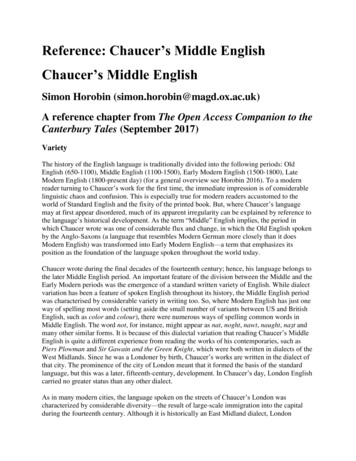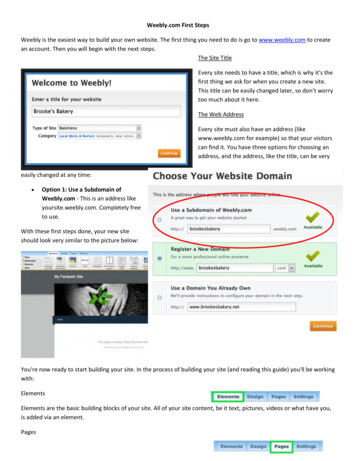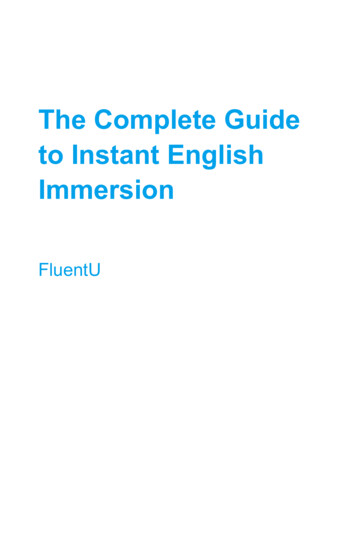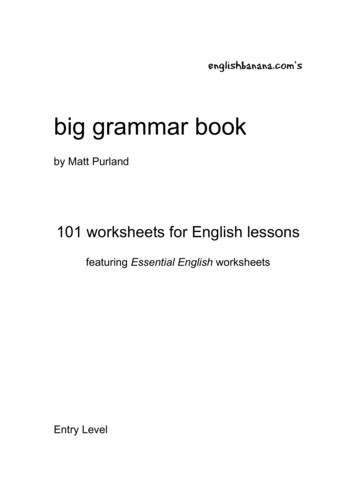
Transcription
Master EnglishHow to Make Requests and SpeakPolitely in EnglishLearn how to makepolite requestsLearn theimportance ofspeaking softlyLearn how topolitely disagreeand turn downinvitations
About this BookIn this book you will learn how to politely 1. Make requests using:- Can / Could- May I- Would2. Ask for permission3. Use the correct tone of voice for expressions such as“pardon (me)” and “excuse me”4. Turn down an invitation5. Disagree
How to speakPolitely in English Making Requests/Asking For SomethingIn English we always use can or could to make requests withfriends and colleagues. “Could” is more polite.Can / CouldTo make polite requests.Example: Can I have a glass of water?Example: Could you pass me the salt?Note: You can put the word “please” in front of the subject orat the end of the sentence; however, it is not necessary.Example: Can I please have a glass of water?Example: Could I have a glass of water please?May IUsed in FORMAL situations: work, school, etc.Example: May I speak with you for a minute?Example: May I sit down?
Note: You can put the word “please” in front of the subject orat the end of the sentence; however, it is not necessary.Example: May I please speak with you for a minute?Example: May I sit down please?WouldWould is used in formal situations and with friends.Would you mind ?Example: Would you mind explaining to me ?Would you be able to ?Example: Would you be able to wash the plates for me? Asking for PermissionThe first two expressions can be used in any situation.Speak with a softer voice or it will sound aggressive.1. Do you mind ?Example: Do you mind if I sit here?2. Would it be a problem if ?Example: Would it be a problem if I take this chair?3. I was wondering if you could ?Example: I was wondering if you could give me a hand withthis project?
SorryWhen we don’t understand what someone says, we say“sorry?” (In a soft voice).Example: Sorry, could you repeat that?Example: Sorry? Pardon (me)?Pardon me is a more polite way of saying sorry. This is usedin FORMAL situations.Note: It is important to understand that you must say this in asoft voice. If you don’t, it sounds aggressive. Excuse MeUsed in these three situations:1. Asking the person to repeat.Example: Excuse me? (Said with a softer voice.)2. Express shock at what the person said.Example: Excuse me! (Said with surprise.)3. You didn’t like the context of what they said.Example: Excuse ME!!! (Said in an aggressive voice.)Practice: with a teacher, trying saying “excuse me” in withthe correct intonation in all three situations.
Turning Down an InvitationIt is important to speak with a softer voice or it will soundaggressive.1. I’m afraid I can’t Example: I’m afraid I can’t go to the party tonight.2. I’d love to but Example: I’d love to go but I’m really busy unfortunately.3. That sounds great but Example: That sounds great but I already have plans. DisagreeingIt is important to speak in a softer tone of voice or it willsound aggressive.I see what you’re saying, but I think Example: I see what you’re saying but I also heardsomething different.You could be right, but don’t forget that Example: You could be right about our president, but don’tforget that he provided this country with healthcare.Yes that’s true, but I’m not sure that Example: Yes, that’s true but I’m not sure I agree.
PracticeWrite a letter to a friend/colleague making (1) requests,(2) asking for permission, (3) turning down an invitation and(4) disagreeing with something. Here is an example:Hello Joseph,(1)Could you please tell me if you are attending this week’s meeting? Also,(2) would it be a problem if I call you tonight to tell you about the newproject?Regarding Saturday’s dinner, (3) I’m afraid I can’t come: I’m really busy.Lastly, (4) you could be right about the new intern, but don’t forget how slowwe were when we first started working here. Anyway, I will see youtomorrow.Yours truly,John Smith
In English we always use can or could to make requests with friends and colleagues. “Could” is more polite. Can / Could To make polite requests. Example: Can I have a glass of water? Example: Could you pass me the salt? Note: You can put the word “please” in front of the subject or











